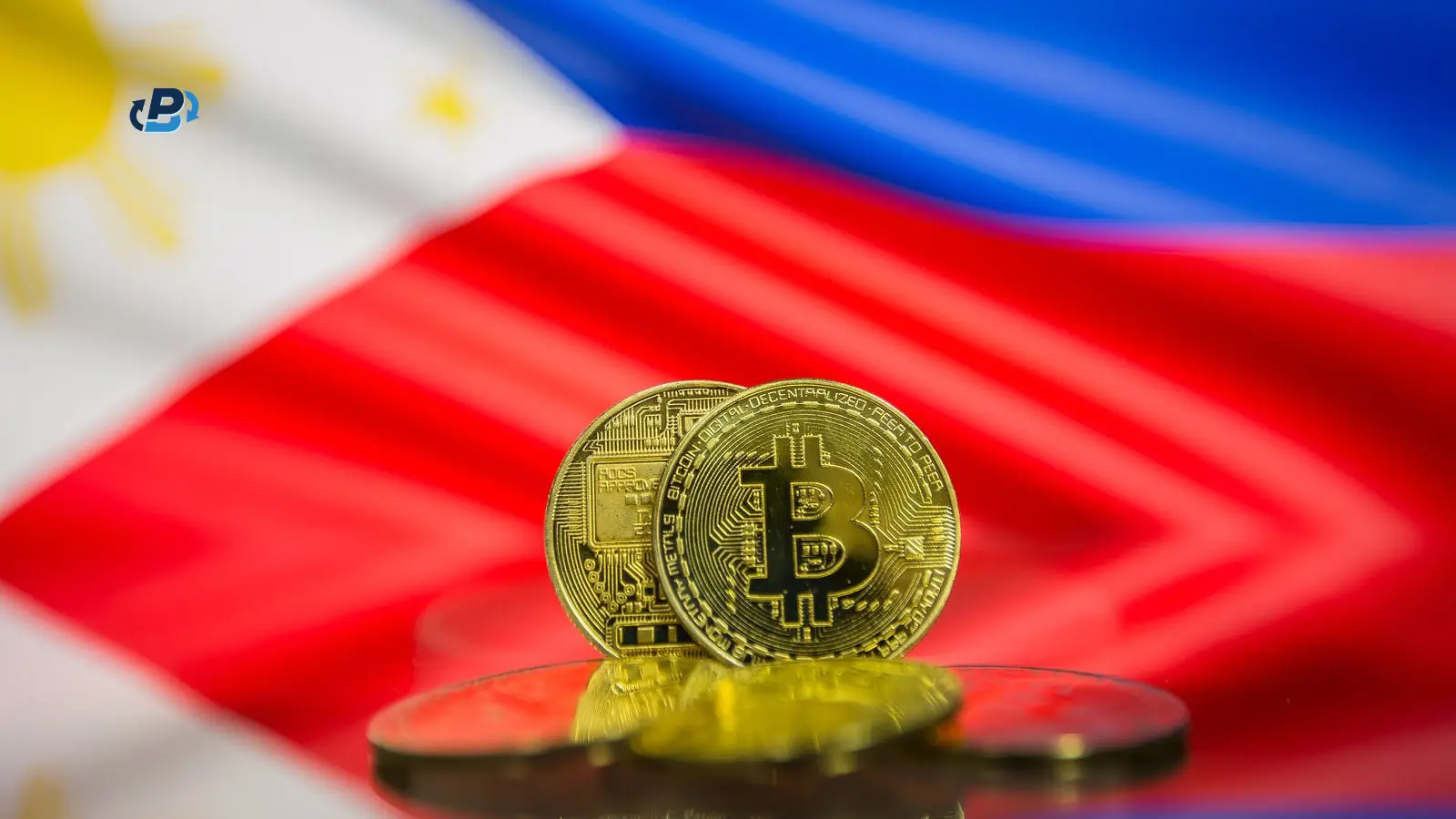This guide will take you through the step-by-step process, explore the regulations, showcase cryptocurrency communities in the Philippines, and talk about other ways to convert your Bitcoin to Philippine Peso (PHP). How do I sell Bitcoin in Philippines? PlasBit offers a handy bank wire option that lets you swap your Bitcoin for fiat currency and send it to your bank account. Our platform supports the Philippines, offering a process for those wanting to cash out their digital assets.
How to Exchange Bitcoin to Philippine Peso?
To exchange Bitcoin for Philippine Peso (PHP) on our platform, follow these simple steps:
1. Deposit your Bitcoin into your account wallet.
2. Go to the "Wire Transfers" section, where you can access information about converting cryptocurrency to Philippine Pesos (PHP) using bank transactions. This section provides details like transfer duration, fees and transaction limits.
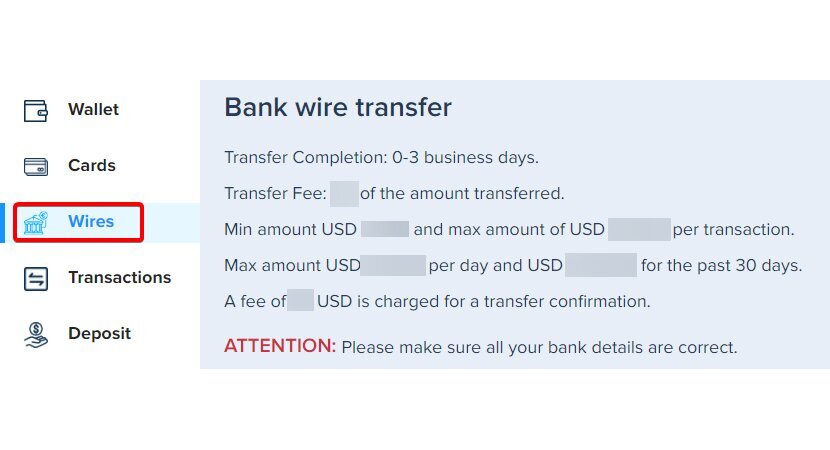
3. Please provide the bank details of the recipient, such as the account name, type, number or IBAN, bank name, BIC/SWIFT code, and address, for the conversion process.
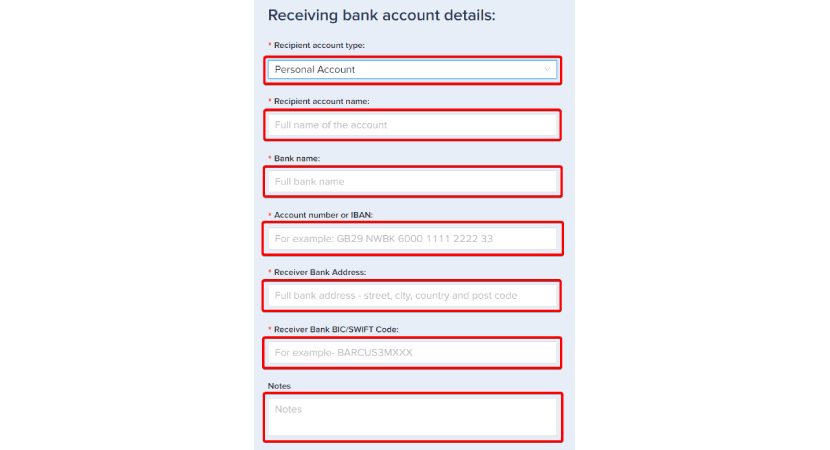
4. Please select the cryptocurrency you'd like to convert to Philippine Pesos (PHP). Our system will promptly calculate the fees and total transfer amount. Make sure your account holds cryptocurrency for the transaction.
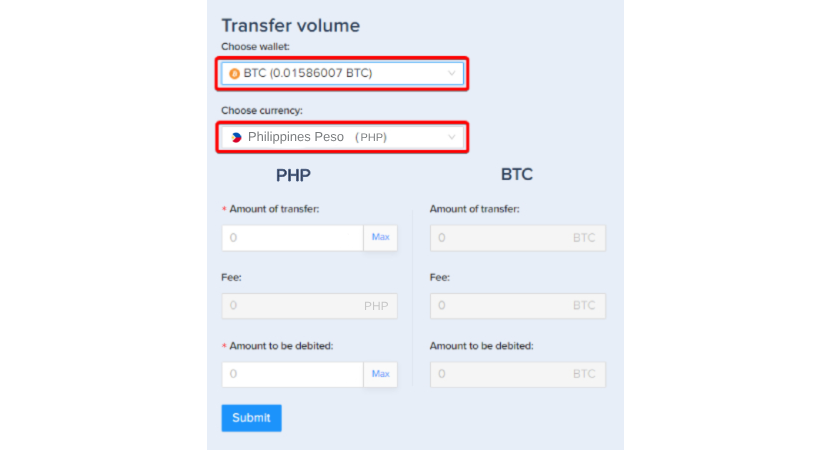
5. Carefully check all the transaction information, then click "Submit" to start the transfer. You will soon get a notification confirming the deducted cryptocurrency amount and can track the progress of the wire transfer in your account.
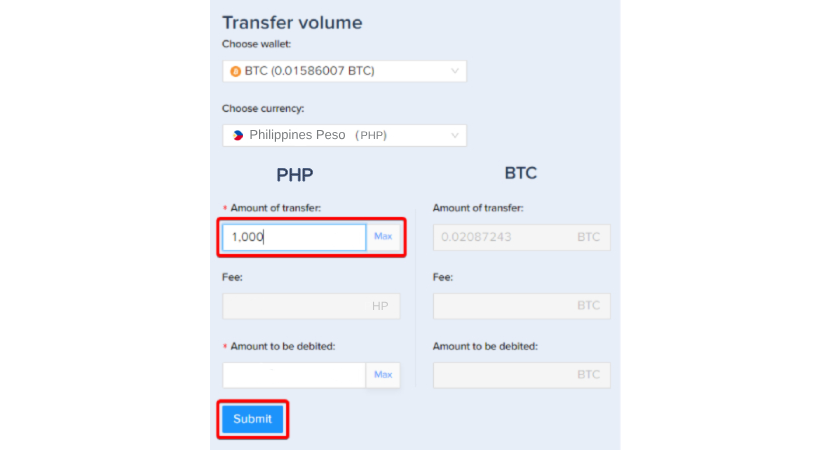
6. Head over to the security verification page. Select "Send" to receive your email and phone verification codes.
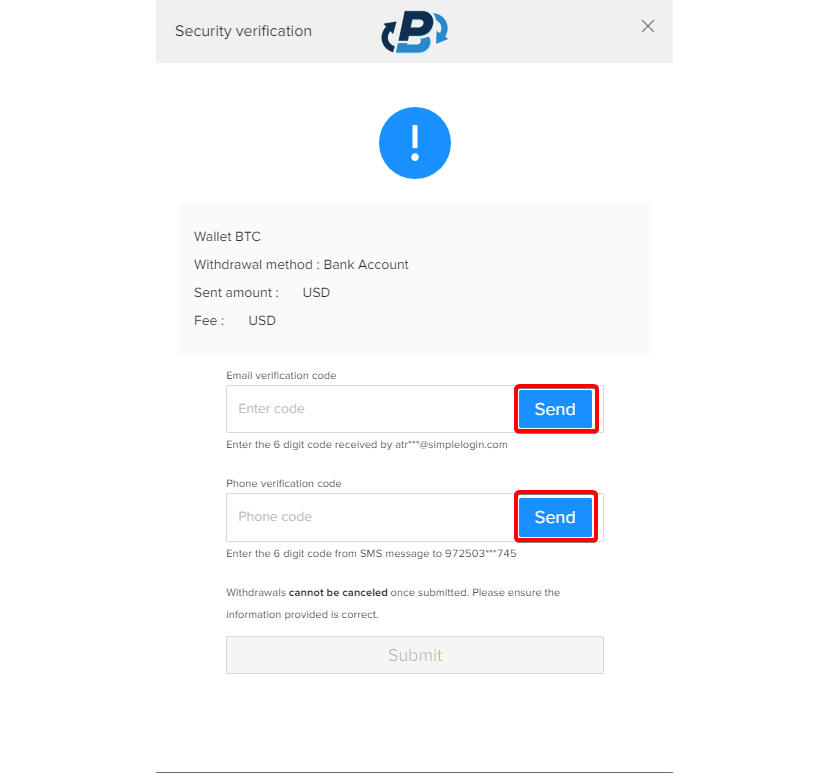
7. Please input the code sent to your email and phone, then click 'Submit'.
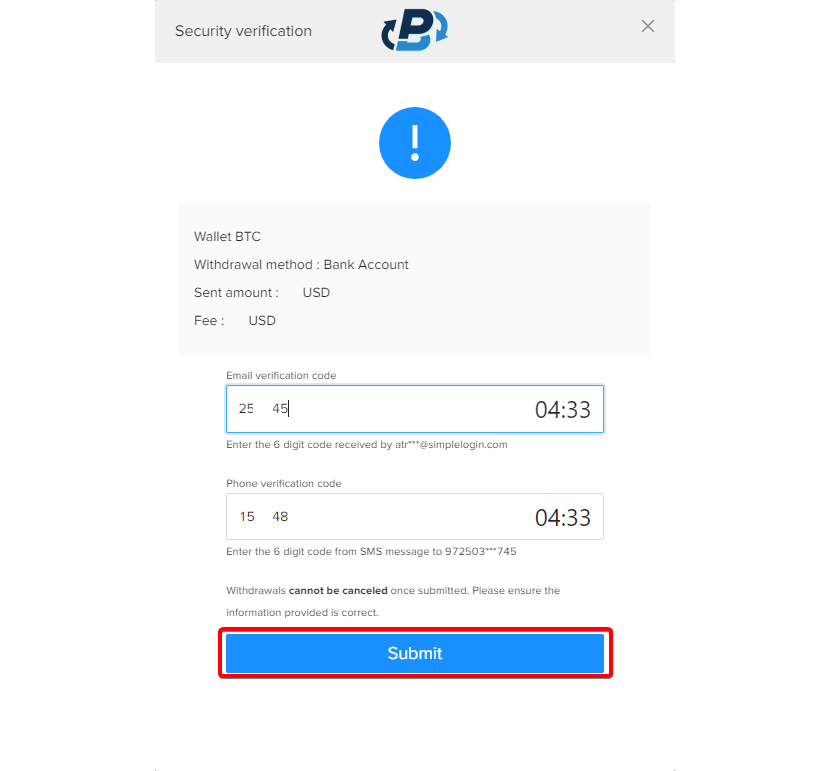
By following these instructions, you can effortlessly convert Bitcoin to Philippine Pesos (PHP) using our platform.
Cryptocurrency Regulations in the Philippines
The regulations governing cryptocurrencies in the Philippines involve efforts from both the Bangko Sentral ng Pilipinas (BSP) and the Securities and Exchange Commission (SEC). Since 2017, when Circular No. 944 was issued by the BSP to officially recognize currencies as payment methods, there has been a focused initiative to establish strong regulatory structures. This directive required virtual currency exchanges to register with the BSP and comply with anti-money laundering (AML) and counter-terrorism financing (CTF) rules, showcasing the government's dedication to maintaining financial system integrity amidst the rapid expansion of the digital asset sector.
In 2021, the BSP reinforced its supervision by introducing Guidelines for Virtual Asset Service Providers (VASPs). These guidelines outline requirements for virtual currency exchanges operating in the Philippines, including obtaining a license from the BSP before starting operations. Additionally, there was an emphasis on implementing Know Your Customer (KYC) and AML/CTF measures to reduce the risks of crimes like money laundering and terrorist financing. Through regulations, the BSP aims to create a transparent environment for cryptocurrency transactions while protecting traders' interests and ensuring stability in the broader financial landscape.
The SEC has been actively involved in managing cryptocurrencies, securities and financial assets in the Philippines. An important move was made in 2018 when the SEC issued a warning to traders regarding the risks of initial coin offerings (ICOs) and cryptocurrency investments. The advisory required companies conducting ICOs to register with the SEC and follow securities regulations showing the government's dedication to protecting traders. Later in December 2022, the SEC emphasized the importance of using regulated exchanges. Cautioned against platforms emphasizing compliance with regulatory standards. Looking forward to January 2023 when draft rules will be presented, the SEC aims to strengthen its power, improve market supervision and address trends in the cryptocurrency sector. These proposed guidelines reflect a stance in adapting regulations to changes in digital asset industry dynamics while promoting trader trust and market integrity.
Is Cryptocurrency Taxable in the Philippines?
Taxation rules for cryptocurrencies in the Philippines are quite intricate and continuously changing. The guidelines cover aspects like capital gains tax (CGT), value-added tax (VAT) and regular income tax. Presently Filipino individuals involved in owning or trading cryptocurrencies need to pay a capital gains tax of up to 15% on profits made from selling or exchanging assets. This tax also applies to transactions where cryptocurrencies are used as a form of payment for goods and services showing the government's commitment to overseeing and taxing the growing asset market.
Apart from the capital gains tax there have been talks within the government about introducing taxes on cryptocurrencies by 2024. There are concerns that the Philippines might adopt a tax rate of 30% on all cryptocurrency earnings following moves made by countries like India. These proposed taxation measures aim to improve transparency in the cryptocurrency sector ensuring that profits from assets are accurately declared and taxed. Additionally by collecting revenue through taxes the government hopes to strengthen safeguards for traders reduce fraud risks and market manipulation and enhance overall financial stability in the digital asset ecosystem.
List of Philippine Crypto Communities
The Philippines boasts a rapidly expanding community of individuals passionate about cryptocurrency, blockchain technology and play-to-earn gaming. From leading the way in decentralized autonomous organizations (DAOs) to organizing exciting events that showcase the latest Web3 advancements the nation plays an important role in the future of digital finance and gaming. Within this environment numerous groups and entities have emerged, each playing a part in promoting technology and its diverse applications across different industries. Let's delve into some of the crypto communities and initiatives in the Philippines that are fueling innovation and empowerment in the economy.
Yield Guild Games:
Yield Guild Games (YGG) is known for its approach in the gaming world blending decentralized finance (DeFi) with gaming through its decentralized autonomous organization (DAO) model. Established in 2020 by Beryl Li and Gabby Dizon, YGG is based in Quezon City, Philippines. Serves as a hub for play-to-earn gaming fans globally. As a Web3 gaming community, YGG has a following dedicated to exploring the possibilities of blockchain technology in gaming. Featuring a variety of Web3 games like Axie Infinity, League of Kingdoms and Illuvium, YGG provides members with opportunities for involvement and advancement.
A key strength of YGG is its presence facilitated by guilds operating under the YGG umbrella. These guilds offer members a platform to connect with others who share interests discover prospects and take part in region-specific activities. Whether you're a player or new to play-to-earn gaming, YGG welcomes everyone to be part of their community. YGG's unique scholarship program helps the community overcome obstacles by granting access to game-related NFTs, enabling participation in play to earn games and share rewards. Moreover YGG is actively exploring opportunities in Web3 esports to cater to the nature of its members and expand its presence in the gaming realm.
The dedication of YGG to education and empowerment shines through initiatives like Web3 Metaversity, a platform aimed at educating users on the core concepts of Web3 technology. By providing resources and training materials, YGG ensures its members are well-equipped with the knowledge required to navigate the Web3 ecosystem. With its strategies and looking projects YGG continues to spearhead innovation in the gaming industry promoting a community-driven ethos that empowers individuals to excel in tomorrow's digital economy.
Cryptocurrency Philippines:
Cryptocurrency Philippines is a Facebook group with a community of over 74,000 members serving as a popular hub for discussions on Bitcoin and other cryptocurrencies in the Philippines. In this community members engage in various conversations to enhance their knowledge of cryptocurrency basics, explore decentralization concepts and discuss the potential of blockchain technology. With a range of materials and insightful dialogues the group offers a platform for individuals to expand their understanding and keep up with the fast-paced world of digital currencies.
Beyond education the group aims to promote technological inclusivity through adoption of blockchain technology. By creating an environment that encourages participation and knowledge sharing, Cryptocurrency Philippines empowers its members to navigate the economy confidently. Through initiatives promoting investing practices and advocating for literacy the group equips individuals with tools to make informed decisions in their cryptocurrency ventures. This democratizes access to opportunities. Facilitates economic empowerment.
By emphasizing principles like DYOR (Do Your Own Research) and due diligence, Cryptocurrency Philippines cultivates a culture of decision-making and critical thinking among its members. Promoting discussions fostering conversations and highlighting the value of learning together the group nurtures a feeling of unity and encouragement among members of the cryptocurrency community. With its initiatives and dedication to progress Cryptocurrency Philippines serves as a guiding light for education, empowerment and creativity in the evolving crypto scene of the Philippines.
Crypto Pinas:
Crypto Pinas is an inclusive community that brings together people who have a shared interest in cryptocurrency, NFTs, blockchain technology and other Web3 innovations. With over 36,000 members, Crypto Pinas acts as a center where enthusiasts, experts and newcomers can come together to discuss and explore aspects of the ever-changing digital landscape. In this community, members dive into the technological advancements, upcoming trends, career prospects and significant developments in the world of Web3.
At Crypto Pinas conversations cover an array of subjects, from analyses of blockchain protocols and decentralized apps to practical tips on cryptocurrency trading strategies, investment potentials and mining activities. Through discussions and knowledge exchange members can share experiences, seek guidance from others and enhance their understanding of how the cryptocurrency ecosystem operates, whether you're an investor or someone new to the field who's interested in Web3 technologies possibilities. Crypto Pinas provides a supportive space where individuals can connect with others to learn and develop together as they navigate through the thrilling realms of digital finance and decentralized innovation.
Blockchain Council of the Philippines:
The Blockchain Council of the Philippines (BCP) is a leading player in the country's blockchain sector dedicated to spearheading efforts that promote the use and integration of technology across industries. Through programs, partnerships and advocacy work, BCP aims to establish itself as a catalyst for change in the Philippine blockchain community. By collaborating with government bodies, industry leaders and community groups BCP strives to create regulations that encourage innovation, ensure transparency and protect the interests of all parties involved in projects.
At the core of BCP's mission is a focus on educating people about technology to empower them with the knowledge and skills necessary to leverage its transformative capabilities. By offering workshops, seminars and informative materials, BCP aims to simplify concepts promote digital literacy and inspire a new wave of enthusiasts and innovators. Through fostering collaboration, inclusivity and responsible leadership practices BCP aims to position the Philippines as a player in global blockchain innovation efforts that drive growth and enable communities to flourish in today's digital era.
Cryptocurrency Adoption in the Philippines
The Philippines has become a player in the world of cryptocurrency adoption, driven partly by the impact of the pandemic. This global situation has led Filipinos to see the potential of cryptocurrency both as an investment opportunity and as a source of income. The country's progress in this area has been boosted by the increasing availability of technology that supports cryptocurrency transactions, bringing it closer to leading adopters like Vietnam and Nigeria. Reports from experts at the Bangko Sentral ng Pilipinas (BSP) have highlighted factors, such as gaming rewards, Bitcoin (BTC), ATM networks and rural banking integration that indicate the growth of cryptocurrency in the Philippines. This growth has positioned it as one of the growing sectors globally when it comes to adopting cryptocurrencies.
Both the Fintech Philippines Association and the European Chamber of Commerce of the Philippines have expressed views on how remarkable the Philippine's rise in cryptocurrency use has been. The surge in Bitcoin's popularity back in 2017 was a milestone for crypto in the country with its value skyrocketing from $1,000 to over $19,000 within a month. Since then BSP has introduced measures to safeguard customers while also promoting greater adoption of Bitcoin.
In recent years, there has been an increase in cryptocurrency usage across the Philippines – especially following a surge in crypto activity in 2021. In Chainalysis's latest report called "The 2022 Global Crypto Adoption Index" the Philippines secured the spot in the list of surveyed countries showcasing its fast adoption of digital currencies. With the country establishing itself as a welcoming environment for the crypto-friendly hub, stakeholders are looking forward to seeing developments in regulations and infrastructure to keep up this trend in the coming years.
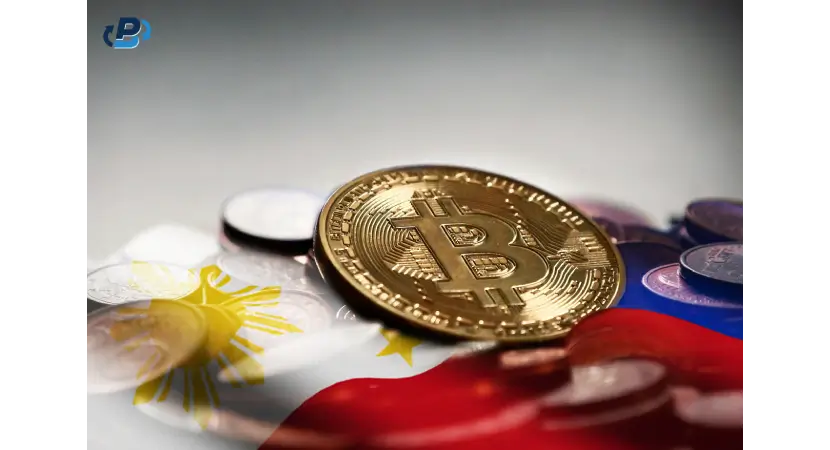
Other Ways for Selling Bitcoin in the Philippines
How do I sell Bitcoin In Philippines? Aside from bank wire transfers, there are other options available for selling Bitcoin in the Philippines.
Crypto ATMs:
Crypto ATMs are becoming more common in the Philippines providing a way for people to buy and sell Bitcoin with cash. These machines offer a familiar way to make transactions in person connecting the world of cryptocurrencies with finance. By allowing users to deposit cash and receive Bitcoin or vice versa, these crypto ATMs cater to an audience from those who are cryptocurrency trading to experienced investors looking to cash out.
As the use of cryptocurrencies grows in the Philippines, the availability of crypto ATMs has also increased, meeting the rising demand for ways to exchange assets. Whether located in shopping malls, convenience stores, or other busy areas, these ATMs serve as spots where individuals can easily convert their Bitcoin into fiat currency and vice versa. The spread of crypto ATMs throughout the country highlights how the cryptocurrency landscape is evolving in the Philippines giving people control over their digital finances.
Crypto Debit Cards:
Cryptocurrency debit cards have transformed how people engage with their assets by connecting traditional finance with the world of cryptocurrencies. These innovative financial instruments make it easy for you to convert your cryptocurrencies into money and use them at countless stores globally just like you would with a standard debit card. As the use of cryptocurrencies continues to rise many companies have joined the market offering a variety of crypto debit card options tailored to different user preferences. Typically these cards work by connecting your cryptocurrency wallets to banking systems, allowing you to instantly convert digital assets into regular currency when making a purchase.
One notable benefit of debit cards is their flexibility giving you the freedom to use your digital assets for everyday shopping both online and in physical stores. Moreover these cards often come with features, like cashback rewards, travel insurance and enhanced security measures that enhance the overall user experience. Additionally crypto debit cards let individuals leverage the value of their cryptocurrency investments without needing to sell their assets, providing a way to access liquidity while still being part of the cryptocurrency market. Cryptocurrency usage is on the rise. Crypto debit cards are becoming more important in everyday financial transactions. They provide you with control and independence over your digital money giving you the flexibility to manage your assets efficiently.
Over-the-Counter (OTC) Trading:
How do I sell Bitcoin in Philippines? OTC trading services have become a part of the cryptocurrency market, offering a private way for people to buy and sell digital currencies. These platforms enable transactions between buyers and sellers handling amounts of digital assets at agreed-upon prices. Institutional traders, worthy individuals, and those making substantial trades prefer OTC trading to avoid affecting market prices. Operating independently from exchanges OTC trading provides participants with enhanced privacy and flexibility to customize transactions based on their preferences.
The attraction of OTC trading lies in its approach and ability to manage transactions with minimal impact on the market. Through OTC platforms, users can access cryptocurrencies and fiat currencies for asset conversion without being restricted by order books or trade volumes. Additionally, OTC trading encourages communication between parties, leading to negotiations and prompt settlement. As the cryptocurrency industry advances, OTC trading services are increasingly crucial in offering liquidity, stability, and confidentiality to individuals navigating the asset realm.
Peer-to-Peer (P2P) Platforms:
Peer-to-peer (P2P) platforms play a role in the cryptocurrency world, serving as meeting points for buyers and sellers to trade directly. These platforms make it easy to exchange currencies by using escrow services that ensure trust and transparency between parties. By utilizing these escrow services, P2P platforms reduce the risks associated with transactions, giving users peace of mind when making transactions. Additionally, P2P platforms offer many payment options, such as bank transfers, online wallets, and even cash transactions, to cater to the preferences of users in the Philippines.
The flexibility of P2P trading platforms is evident in their ability to accommodate both experienced traders and support transactions in fiat currencies and cryptocurrencies. With the convenience of access, users can participate in trading activities at their own pace without being constrained by traditional financial institutions. Furthermore, these platforms create environments where users can connect, collaborate, and share knowledge, fostering a community atmosphere within the cryptocurrency industry. The rise in the use of cryptocurrencies is leading to a reliance on P2P trading platforms, which are becoming more important in enabling transactions and fostering innovation and accessibility in the digital asset space.
Factors to Consider When Choosing a Method
When deciding on how to sell Bitcoin, it's important to consider key factors to make sure the transaction goes smoothly;
Fees:
Take a look at the fees involved in each method, including transaction fees, withdrawal fees, and exchange rate fees. Compare these charges from platforms. Go for an option with fair rates and clear fee structures to keep costs down.
Security:
Look for platforms that prioritize security features like factor authentication, encryption protocols, and secure storage solutions. PlasBit prioritizes the security of your personal data, ensuring complete protection against potential threats. With 100% of user cryptocurrencies stored offline in cold storage and rigorous security measures such as two-factor authentication and regular penetration tests, we are committed to giving a safe and reliable platform for all your crypto transactions. Check the platform's reputation, regulatory standing, and user feedback to gauge its trustworthiness and reduce the risks of fraud or theft.
Liquidity:
Check how liquid your chosen method is to ensure transaction processing and access to market liquidity. Choose platforms with liquidity levels, large user bases, significant trading volumes, and established liquidity pools for transactions at competitive prices.
Conclusion
How do I sell Bitcoin in Philippines? Selling Bitcoin for real money in the Philippines is quite doable and simple with platforms like PlasBit that provide bank wire transfer options. Apart from bank wire transfers, there are other ways, like using crypto debit cards, engaging in over-the-counter (OTC) trades, utilizing crypto ATMs and joining Peer-to-Peer (P2P) platforms. It's important to consider factors such as fees, security measures, and liquidity when selecting a method. In general, the Philippines provides an environment for cryptocurrency dealings due to its developing regulations and expanding crypto community. This enables individuals to sell their Bitcoins while complying with requirements and tax duties.




